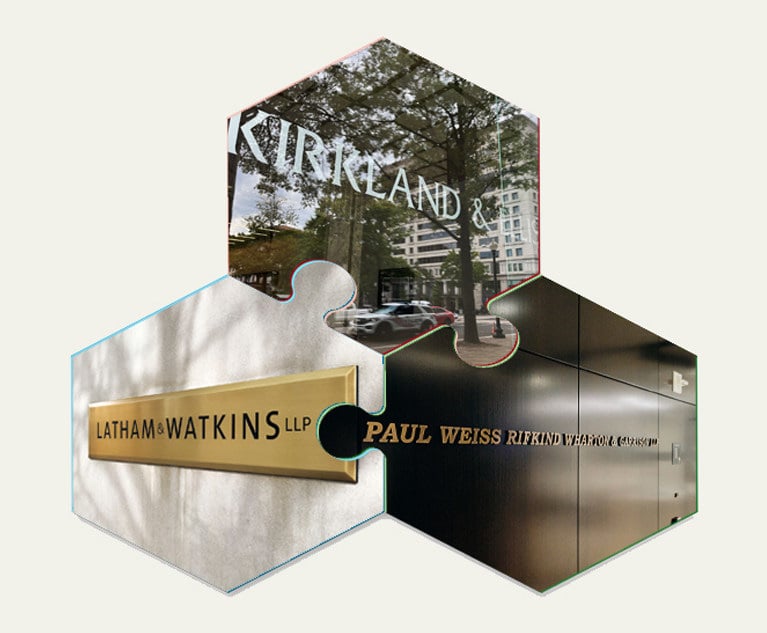Law Firms Need Informal Reporting Programs to Quash Sexual Harassment
By establishing a neutral reporting resource for inappropriate behavior, firms can help keep women safe and satisfied, benefiting everyone.
August 15, 2018 at 01:00 PM
7 minute read

Oct. 5 will mark one year since Harvey Weinstein was first accused of sexual harassment. That story, first reported in The New York Times last year, gave rise to the country's #MeToo and #TimesUp movements, highlighting the issue of sexual harassment and gender inequity in the workplace. This type of misconduct doesn't just happen in “other” workplaces; it happens in the legal arena too. Because harassment and inequity go hand in hand, law firm leaders must work to solve both issues in tandem.
By taking four steps to address potential problems, chairs and managing partners can significantly increase their chances of retaining their female and minority attorneys: conduct a robust climate survey to understand people's experiences with harassment and misconduct; ensure that the firms they lead have comprehensive, multifaceted reporting programs in place; communicate the reporting and resolution options that have been put in place; and hold bad actors accountable.
The research is clear: gender inequality is a significant predictor of sexual harassment occurring in a workplace. This means that the fewer women in an office, the higher the likelihood that harassment occurs. The higher the likelihood of harassment occurring, the higher the likelihood that women will leave a workplace. This cycle obviously presents a conundrum for firm management and has real consequences: half of the women who join Big Law leave before they are eligible for partnership, and only 19 percent of equity partners in law firms are women.
It is clear that the problem of harassment can't be grappled with in isolation; law firms must try to tackle both harassment and inequality simultaneously. There are concrete steps that leaders can take to improve their firms' environments. While firms can't control the actions of their attorneys and other employees, they can revamp their programs for reporting and resolving misconduct. The revised programs should be comprised of a variety of options for employees, including an ombudsman (or ombud), an informal resource to whom an employee can turn to report misconduct.
To create more robust, comprehensive programs for reporting and resolving misconduct, law firm leaders can take their lead from other leading global organizations, including McKinsey & Co., Pfizer, Shell, Mars and Kaiser Permanente, as well as Stanford, Harvard and Yale. These world-class organizations distinguish themselves from law firms by offering their employees both formal and informal ways of reporting misconduct. In contrast, very few law firms have informal programs in place through which employees can report harassment and other misconduct.
A law firm's formal process for reporting misconduct typically includes a procedure through which an employee can reach out to human resources or the firm's general counsel. Because these resources are considered “offices of record” by law, however, an employee's report regarding misconduct to either HR or the GC requires the firm to act on the employee's report. If the firm does not take action when its HR or GC offices are made aware of alleged harassment or misconduct, the firm (and therefore its partnership) risk significant legal consequences. Therefore, professionals who work in HR or as part of the GC's team may not keep employees' confidences; by law, they are required to act on any reports of misbehavior.
For many good reasons aligned with their firm's interests, women who have been the object of misconduct don't always want to institute a formal investigation or lodge a formal complaint. Instead, many may prefer to explore other options for resolution. When a firm only offers one formal way to report harassment or misconduct, it is unknowingly exacerbating an already difficult situation. When a firm does not offer a more informal process through which employees can convey harassment or inappropriate behavior, many aggrieved women simply vote with their feet. Leaving the firm becomes their best informal option.
This is precisely why best-in-class organizations offer their employees an independent process for reporting as an alternative solution to going to a firm's HR department or the firm's GC, such as an ombud. Ombuds operate independently of a firm's existing hierarchy; they do not report to anyone other than a chair or managing partner. Because ombuds operate outside of a firm's structure, they are by definition considered informal. Therefore, when employees reach out to an ombud for confidential support, they do not put a firm on legal notice, and ombuds are not required to act. This unique position allows an ombud to keep employees' confidences.
Ombuds are a resource for both employees and management. Formally trained to help employees think through difficult situations and consider different options for resolution, ombuds are neutral parties. They are expert facilitators who empower employees to seek resolution on their own terms. Ombuds serve firm management by keeping the chair or managing partner apprised of significant individual or organizational concerns. They track and report firmwide trends and, by doing so, act as firms' early warning systems. Because of the unique role that they play in firms, best-in-class ombuds are classically trained and certified by the International Ombudsman Association.
A recently released survey of workplace conduct and behaviors in law firms found that close to half of the female attorneys who shared that they had experienced harassment or bullying between 2010 and 2018 said that they did not know whether the firm in which they worked at the time of the incident had a reporting process.
Once a law firm has its internal dispute resolution offerings in place for employees, it is critical for leadership to launch a sustained internal marketing and communications campaign about the different options. The marketing and communications plan should focus on building awareness around four topics:
- Why the firm has revamped its resources for employees;
- What the firm's formal and informal resources are for reporting and resolving concerns about behavior that is perceived as inappropriate;
- How the different resources work;
- And how employees can initiate outreach to the formal and informal resources of the firm.
The approach of the one-year anniversary of the incident giving rise to #MeToo offers law firm leaders an opportunity to reflect on what they have done to address the issue of misconduct and inequity in their firms over the last year.
Leaders can stem the female flight from their firms. They can take a first step by anonymously surveying their employees to better understand their colleagues' experiences at the firm. Management teams can leverage that survey data to bolster their existing programs for reporting and resolving misconduct. To ensure that employees have as many resources for reporting misconduct as possible, leaders should put ombuds programs in place. They should then conduct internal marketing campaigns to make certain that all employees are familiar with the firm's different options for handling dispute resolution. And, perhaps most importantly, leaders should then prepare to hold their bad actors accountable if and when they are made aware of colleagues' misconduct.
Offering employees an array of opportunities, both formal and informal, to communicate inappropriate behavior achieves several priorities for law firms and their leaders. Not only can a blended program stem the female flight from Big Law and correct the misperception that firms have become inhospitable places for women to work, it can also provide competitive advantage with talent, clients and potential clients. Law firms have nothing to lose by supplementing their formal reporting mechanisms with informal resources. And they have everything to gain.
Gwen Mellor is a management consultant to law firms. A partner at Zeughauser Group, her work includes consulting on the establishment of effective ombuds programs as part of firms' efforts to achieve greater gender and other diversity.
This content has been archived. It is available through our partners, LexisNexis® and Bloomberg Law.
To view this content, please continue to their sites.
Not a Lexis Subscriber?
Subscribe Now
Not a Bloomberg Law Subscriber?
Subscribe Now
NOT FOR REPRINT
© 2025 ALM Global, LLC, All Rights Reserved. Request academic re-use from www.copyright.com. All other uses, submit a request to [email protected]. For more information visit Asset & Logo Licensing.
You Might Like
View All

Change Is Coming With the New Trump Era. For Big Law, Change Is Already Here
6 minute read

Trending Stories
- 1Uber Files RICO Suit Against Plaintiff-Side Firms Alleging Fraudulent Injury Claims
- 2The Law Firm Disrupted: Scrutinizing the Elephant More Than the Mouse
- 3Inherent Diminished Value Damages Unavailable to 3rd-Party Claimants, Court Says
- 4Pa. Defense Firm Sued by Client Over Ex-Eagles Player's $43.5M Med Mal Win
- 5Losses Mount at Morris Manning, but Departing Ex-Chair Stays Bullish About His Old Firm's Future
Who Got The Work
J. Brugh Lower of Gibbons has entered an appearance for industrial equipment supplier Devco Corporation in a pending trademark infringement lawsuit. The suit, accusing the defendant of selling knock-off Graco products, was filed Dec. 18 in New Jersey District Court by Rivkin Radler on behalf of Graco Inc. and Graco Minnesota. The case, assigned to U.S. District Judge Zahid N. Quraishi, is 3:24-cv-11294, Graco Inc. et al v. Devco Corporation.
Who Got The Work
Rebecca Maller-Stein and Kent A. Yalowitz of Arnold & Porter Kaye Scholer have entered their appearances for Hanaco Venture Capital and its executives, Lior Prosor and David Frankel, in a pending securities lawsuit. The action, filed on Dec. 24 in New York Southern District Court by Zell, Aron & Co. on behalf of Goldeneye Advisors, accuses the defendants of negligently and fraudulently managing the plaintiff's $1 million investment. The case, assigned to U.S. District Judge Vernon S. Broderick, is 1:24-cv-09918, Goldeneye Advisors, LLC v. Hanaco Venture Capital, Ltd. et al.
Who Got The Work
Attorneys from A&O Shearman has stepped in as defense counsel for Toronto-Dominion Bank and other defendants in a pending securities class action. The suit, filed Dec. 11 in New York Southern District Court by Bleichmar Fonti & Auld, accuses the defendants of concealing the bank's 'pervasive' deficiencies in regards to its compliance with the Bank Secrecy Act and the quality of its anti-money laundering controls. The case, assigned to U.S. District Judge Arun Subramanian, is 1:24-cv-09445, Gonzalez v. The Toronto-Dominion Bank et al.
Who Got The Work
Crown Castle International, a Pennsylvania company providing shared communications infrastructure, has turned to Luke D. Wolf of Gordon Rees Scully Mansukhani to fend off a pending breach-of-contract lawsuit. The court action, filed Nov. 25 in Michigan Eastern District Court by Hooper Hathaway PC on behalf of The Town Residences LLC, accuses Crown Castle of failing to transfer approximately $30,000 in utility payments from T-Mobile in breach of a roof-top lease and assignment agreement. The case, assigned to U.S. District Judge Susan K. Declercq, is 2:24-cv-13131, The Town Residences LLC v. T-Mobile US, Inc. et al.
Who Got The Work
Wilfred P. Coronato and Daniel M. Schwartz of McCarter & English have stepped in as defense counsel to Electrolux Home Products Inc. in a pending product liability lawsuit. The court action, filed Nov. 26 in New York Eastern District Court by Poulos Lopiccolo PC and Nagel Rice LLP on behalf of David Stern, alleges that the defendant's refrigerators’ drawers and shelving repeatedly break and fall apart within months after purchase. The case, assigned to U.S. District Judge Joan M. Azrack, is 2:24-cv-08204, Stern v. Electrolux Home Products, Inc.
Featured Firms
Law Offices of Gary Martin Hays & Associates, P.C.
(470) 294-1674
Law Offices of Mark E. Salomone
(857) 444-6468
Smith & Hassler
(713) 739-1250










